
Staff and calendar set by Board of trustees
Employment of the staff and
approval of the college calendar
for the 1973-74 school year
highlighted the Board of
Trustees meeting March 21.
Faculty and administrators
will remain the same next year,
with no expected additions in
number. As a sidenote art
instructor Bill Merrill and
counselor Richard Hendry were
granted tenure. Both are
completing their third year at
Peninsula.
The college calendar
underwent little change from its
original package as approved
by the faculty association.
The association’s calendar
committee had originally aimed
for equal days of instruction
each quarter. This was later
amended, as was finals week
and the date of
Commencement.
Of concern to the board was
the lateness of the June 15
graduation. Many students face
possible conflicts with summer
jobs.
The calendar was approved
as submitted and provides for
180 total contract days.
Bids for the installation of
fencing on the east side of the
auto-diesel building were
reviewed. The fenced area will
be used as a storage lot for the
school’s vehicles.
Clearing of the tennis court
site and an access stgp for the
cathodic protection installation
also was approved.
A public disclosure policy was
adopted on recommendation of
the state attorney general’s
office. The policy comes as the
result of the passage of
Initiative 276 last November.
The policy defines the nature of
public records, rights of access
to such documents, and request
procedures.
In other business, the board
heard a report on the $40 per
month increase in the salaries
of classified personnel. The
increase is retroactive to
February, and includes a 23
cent per hour raise for part
time help and students on the
work-study program.
Because of the maximum
hour-wage stipulation in the
work-study program, all
students must take a cut in
hours because of the increase.
The state office allotment of
1,018 FTE’s (full-time
enrollments) for the 1973-74
school year was announced. The
administration’s estimate of
actual FTE’s is 940, with “no
anticipated growth” foreseen.
SEARCH Chairman Wilfred
Morrish gave a report on the
recent Alderbrook conference,
and President John Maier gave
a summary of legislation now
before the special session in
Olympia.
BOC filing period opens April 30
Students whp plan to run in the election for next year’s
student body offices May 11 can
begin filing for office April 30.
Four offices (president, vice
president, secretary, and
treasurer) will be filled in this
election, and the winners will
take office next fall.
A student will become a
candidate with 25 to 35
signatures on a petition for
candidacy. The petitions will be
distributed through Mr. James
Lunt, after April 30.
Other qualifications for
candidacy are that a student
must obtain sophomore
standing (over 40 credits) by
fall, be a full time student, and
maintain a 2.0 grade average.
Election results will be
announced the evening of May
12 at the Watch Night Dance. In last year’s student body election, Jim Clem defeated
three opponents for the
presidency after a second runoff ballot had to be taken
between Clem and Terry
Diimell, and the mandatory 40
per cent of the total vote went to
Clem.
The student body president
serves as chairman of the
Board of Control (BOC). This is
a student association which
sponsors activities, ratifies club
constitutions and decides how
activities funds will be used.
The BOC president also
represents Peninsula College at
other schools, and leads
assemblies.
Vice president of the student
body, an office now held by Ken
Singhose, is the activities
chairman of the four officers.
Maria James to attend conclave

Minority Affairs Advisor Ms.
Jean Hunt has been notified that
Maria James, a Jamestown
Clallam, is one of 22 Indian
students nationwide to be
chosen to attend a conference of
Indian students in Washington,
D.C., April 24-26.
The purpose of the conference
is to discuss financial aids
available to native American
students and to formulate a
National Indian Students’
Coalition.
Marir spoke before the Civil
Rights Commission March 31.
Maria spoke specifically on the
problems faced by Indian
students in the public school
system.
A first year psychology
major, Maria has been chosen
as the offical student
representative on the Indian
Advisory board to the college.
Victoria trip, dances on tap as BOC activities
An all-day bus trip to Victoria
will leave from the college
Saturday, May 5.
Students who purchase $4
tickets will visit the Butchart
Gardens in Victoria and their
bus tour will include a drive
past the University of Victoria.
An hour of individual
sightseeing will start when the
group is let off the bus at
Thunderbird Park, near the
Empress Hotel.
BOC President Jim Clem is
booking what he calls “the
hottest band on the west coast”
to play at a day-long work and
music outdoor event at PC May
12.
The band, “Lance Romance
and the three minute Boogie,”
will cost BOC $750, and will play
at the dance to follow a campus
clean-up day and an all-school
free picnic for those who help in
the ecology work.
Advertising for the day of
events will be done through
students, and BOC is offering a
cassette tape recorder as first
prize in a poster contest. Entries are to illustrate any
part of the day’s events.
During the Watch Night
Dance the night of May 12, at
which Lane Romance will play,
winners of the election for
student body officers and the
winner of the poster contest will
be announced.
At the March 2 meeting of the
BOC, Mary Roblan asked the
officers to appoint one student
to vote on the Community
Involvement Program
committee. This representative
will be selected from among the
members of the Auto-Diesel
Club, they decided.
Mr. James Lunt again
purchased 10 season tickets to
next year’s Community Concert
series on behalf of the BOC.
These tickets, bought every
year and always popular, can
be checked out by students upon
request.
Art display continues to 16
Original student art work of
the Peninsula College Adult
Evening Education oil painting
class, instructed by Gladys B.
Johnson, is now displayed at the
foyer of the college Fine Arts
Building. The display will
continue for three weeks
through April 16.
Spring quarter classes in
beginning and intermediate oil
or acrylic painting started
March 26 at Joyce. Landscape
and still life are featured.
Paintings displayed are by
Mmes. Ruth J. Durrwachter,
Fran Haughey, Janice M.
Meyer, Mabel M. Miller, Betty
L. Myhres, Treva Z. Pratt and
Zoel Thomson, Misses Judith P.
Durrwachter, Carol S. Johnson,
Marietta Santos and Messers.
Harry Conner and Steve D.
Myhres.
Others participating in the
fall and winter quarters are
Mmes. Ebba Brophy, Pat
Harvey, Kinney Pender, Susie
Sweatt, Juanita L. Thompson,
Miss Diana Gallatin and
Messers. Shawn L. Doubek,
Steve Earle and Donald
Wildman.
Many opening available through placement office
Using microfilmed state-wide
job listings and local
employers’ openings, Mrs. Sue
Hammond aids Peninsula
College students in finding jobs
to fit their qualifications.
The microfilmed pages are
published three times weekly by
the Central Job Bank in
Olympia, and are displayed in
the PUB and in Mrs.
Hammond’s office. Local
employers call her if they have
an opening and tell her what
skills are necessary. A number
of students have been placed in
part-time jobs. Working closely
with the instructors, she also
assists students in finding
career positions.
For example, when a student
brings in the twelve digits listed
on the left of any job on the
microfilmed list, she looks it up
on her viewer, checks the
student’s qualifications, and
then notifies the Washington
State Employment Security
office, better known as the
unemployment office.
If an employer calls her with
a job, she checks her file of
student applicants to find
someone with the required
skills. Then she notifies the
student and arranges an
interview.
Mrs. Hammond keeps a file of
jobs and student qualifications.
She is in her office daily from 9
a.m. to noon, and 1 to 3 p.m.
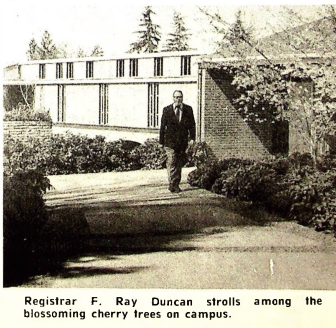
Editorial
Commencement roadblock
Few Peninsula students are able to get by without
working at least part-time. Summer employment is
particularly critical, as the money made and saved
during vacation can be the determining factor in
whether a student returns or not.
The competition for the few really good summer
jobs is furious. In some cases, jobs are offered on a
first come, first served basis. With the last
commencement next spring, PC students will enter
the job hunt disadvantaged. June 15 is simply too late
to release students from school.
Without advocating the ultimate sin of shorter
instruction quarters in the spring quarter, we
encourage both faculty and administrators to study
the problem and give full consideration to closing
dates.
Summer jobs are important to students. Make them
important to you.
—Rich Olson

The Best Man (Woman)
Though it may seem distant, the filing period for
BOC offices is rapidly approaching. Now is the time to
look around for candidates of your choice: and to
scrutinize them with an eye toward quality of
leadership.
On the heavy side, the associated students officers
determine how to spend the activity fee portion of your
tuition within a total budget in excess of $30,000. On the
lighter side, the leaders select and sponsor the social
events that will entertain you next year, that dance
where you just might meet that certain girl (guy).
Of particular importance is the position of BOC vice
president. All too often, student leadership has been
passed on to a novice when presidents are unable to
complete their term.
Fall quarter is a long way off, and there is the pause
of summer vacation to ponder the outcome, but the
BOC elections are very critical and significant; and a
lot closer than you think.
What’s up?
In recent years our Japanese
language is becoming
disorganized; English is too.
Since I came here, I have heard
various expressions which I
have never heard in Japan. One
of these is about the word up.
It is easy to understand the
meaning of up, toward the sky
or toward the top of a list, but
when you wake, why do you
wake up? Why do you pack up a
parcel, speak up at a meeting,
fill up with gas, finish up the
food and make up the face?
Often the word up isn’t
needed; at other times it has
special meanings. To be
dressed is one thing, but to be
— Rich Olson
Letters
Indian student speaks out
Editor, The Buccaneer:
With all the publicity the
American Indians are getting
lately some of you may be
wondering why you haven’t
heard anything from the
Indians on this campus. Well,
you’re about to hear a lot
because I for one refuse to keep
my mouth shut any longer.
To start with, I would like to
say thumbs up to Marlon
Brando. For those of you who
saw the Oscar awards, you
know that Mr. Brando refused
his Oscar in behalf of the
treatment of native Americans
by the motion picture industry,
and the television industry. All
my life I have been disturbed by
the atrocious portrayal of
Indians in western movies and
on television programs.
But what can one lone
Clallam do? Not much, but
things are changing and I
expect that with actions such as
Marlon Brando has taken, and
action taken in the future by
others, I feel that my people
may get a fair deal.
I could tell by the boos the
young Indian woman got when
she explained why she was
there that some people thought
she was out of line to bring the
subject up at the Academy
Awards ceremony. But, I think
it was the most appropriate
time. I would like to add a
thumbs down to Clint Eastwood
for the remark he make
jokingly (sic) about all the
cowboys killed in movies. The
Indian movement is no longer a
laughing matter. I wouldn’t be
surprised if he finds a few
flaming arrows stuck in his
front door.
I have a number of issues I
would like to bring up but I will
bring them up at a later date
If any of you would like to get
a better understanding of native
Americans, there is a new class
being offered this quarter called
the Northwest Indian Today,
and taught by Jean Hunt.
Hopefully, this will help the nonwhites have a better
understanding of the native
Indian people, and help the
Indian students to have a better
understanding of tribal
government, and the problems
the Indian people encounter
today.
Maria James
What’s up?
In recent years our Japanese
language is becoming
disorganized; English is too.
Since I came here, I have heard
various expressions which I
have never heard in Japan. One
of these is about the word up.
It is easy to understand the
meaning of up, toward the sky
or toward the top of a list, but
when you wake, why do you
wake up? Why do you pack up a
parcel, speak up at a meeting,
fill up with gas, finish up the
food and make up the face?
Often the word up isn’t
needed; at other times it has
special meanings. To be
dressed is one thing, but to be
dressed up is special. People
line up for tickets, think up
excuses, get tied up in traffic
and get tied up in traffic. You
open a store in the morning and
close it up at night.
I think you seem to be mixed
up about up. In one desk size
dictionary, up takes up half of a
page, and listed definitions add
up to about 40.1 have heard that
if you try to build up a list of the
many ways in which up is
used, and if you don’t give up,
you may wind up with a
thousand.
What is up?
Takao Yanagisawa
Exchange Student
Kismet
By JEAN IVERSON —
One of the most interesting aspects of school for me so far
this year has been watching the different antics and
mannerisms belonging to some of the various instructors at
Peninsula.
It seems that each instructor that I have come across has
certain traits that set him or her apart from any other
instructor.
Most fascinating is one art instructor who, through the
way he walks and talks, resembles Humphrey Bogart. It
would be no surprise to see him dressed in a trench coat, his
collar up, walk on the stage of the Little Theater after an art
film, turn around and say: “Play it again, Sam.”
Another instructor, while reading, had the habit of always
managing to put one of his incredibly thin legs up parallel to
his podium. This made him, amazingly enough, resemble
Fearless Fly, and I couldn’t help wondering if, at any time,
he might start walking up the wall.
One social science professor has the amusing habit of
always hopping around in front of the chalkboard, drawing
pictures of rats and dogs. He is one of the best instructors,
by not trying to impress the students with what he knows
about hissubject. The students and instructor are on a more
equal basis.
Another instructor in the history department had a very
dry sense of humor, and his mannerisms resembled a cross
between Jack Benny, with his arms folded, and George
Burns, only substituting a pipe for the ever-present cigar.
He always livened up his classroom by taking his pipe out of
his mouth and delivering a humorous anecdote pertaining
to the subject being discussed.
Last and most amusing was the gym instructor, who, like
most gym instructors, couldn’t perform any of the skills
that we students were required to learn. When
demonstrating the overhand volleyball serve, the
instructor smashed the ball into the net—not once, but three
times. At least he was consistent.
‘Summer of ’42’ next in series
The next movie in the BOCsponsored film series is
“Summer of ‘42.” It will be
shown Sunday, April 15, at 7
p.m. in the Little Theater.
From a movie house to a war
widow’s bedroom, “Summer of
‘42” relives a boy’s 15th
summer, when he was called
Hermie, and on the threshold of
manhood. Delightful nostalgia
for some, touching comedy for
others, “Summer of ‘42” is
timeless, as true yesterday as it
will be tomorrow.
Scored by Academy Award
winner Michel Legrand, the
movie stars Jennifer O’Neill,
Gary Grimes, Jerry Houser and
Oliver Conant.
Tide Pools deadline near
Final deadlines for the 1973
Tide Pools, Peninsula’s literary
magazine, have been set the
third week in April.
The publication is due to be
complete in time for sales
during the week before spring
quarter finals.
The magazine’s editorial
committee, under the direction
of Miss Avalon, faculty advisor,
indicatesthat students may still
submit original compositions,
artwork and photographs for
consideration.
In particular, the committee
requires additional artwork,
preferably pen and ink
drawings.
Short stories, poetry and
essays are also welcome.
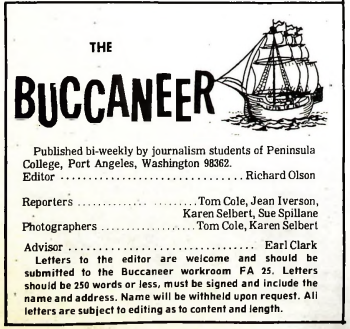
Survey indicates interest and tests make for better grades
By SUE SPILLANE
ANDRICHOLSON
(Editor’s Note: Through a
random survey of both faculty
and students, The Buccaneer
has attempted to track down
and study the elusive subject of
grades. Though grades and
grading have universal effects,
the process by which they are
derived and awarded often
remains a mystery. With this
article the mystery certainly
remains unsolved, but some
new and interesting evidence
has been uncovered.)
Results of a Buccaneer
questionnaire on grades,
answered by 40 students and 14
instructors, indicate that
students may be losing credit by
discounting the factors of
interest and class participation.
Only 27 per cent of students
polled in the survey felt that
their participation in class was
figured into their grade, in spite
of the fact that 57 per cent of the
instructors who answered said
they did consider it.
Half the instructors polled
said a student’s interest in the
course was a factor in his grade,
but a mere 17 per cent of
students thought so.
This grades survey was
conceived with the idea that
grades, and feelings about
grades, can alienate student
and instructor. We wanted to
know how far apart (or close)
students and instructors are in
their conclusions about the
letter-grading system.
The majority of students and
instructors agree that a C is an
average grade, although a
significant group on both sides
prefers to call C plus average.
Eleven of the 14 instructors to
answer said that grades are a
good indication of what a
student has learned from a
course, but the students
couldn’t agree. Fifteen said
they weren’t, 11 thought they
were, and nine were uncertain.
A similar split in student vote
came when we asked for
advocates of a no-grades
system: 12 yes, 11 no, 10 yes and
no.
Instructors, however, are
sure that grades motivate
students. 71 per cent felt they
did.
In an interview with Dean of
Instruction Mr. Floyd Young,
the administrator stated that
the typicalstudent’s grade point
average has continuously
increased in all college
institutions. A G.P.A. of 2.0 10
years ago, would be the
equivalent of a 2.6 today, he
said.
Most instructors feel that they
are moderately hard graders,
and the majority of students
asked felt that instructors at
P.C. mark fairly. Seven of the 40
thought the marking too hard.
More than half of the students
to reply said they are trying to
earn the best grades. Only two
marked “who cares?” and 67
per cent would rather take a
hard but interesting class and
risk a low grade than take aboring class for a sure grade.
These results correspond with
the instructors’ majority belief
that most of their students seek
excellent grades. Seven thought
fear of grades might cause
some students to avoid taking
their course, but six said it
definitely wouldn’t.
In the charts on this page,
which generalize what
instructors figure in grading
and what students think
instructors figure in grading, it
is shown that both rank extra
work of least importance to the
grade.
Students believe instructors
count tests more than the final
exam, but instructors indicate a
reliance on the exam over the
tests in calculating the final
grade.
Many replies to the
questionnaire commented on
the value of the letter-grading
system. Some student comments:
Physics major: I would like to
see a grading system based on
100 points. It would be 20 times
more accurate than the present
system.
Journalism major: The
present grading system places
too much emphasis on
competition—the goal seems to
be to outdo your peers.
General major: I attend
Peninsula to learn and be
exposed to subjects I know little
about. It seems like grades and
worrying about these grades
are unnecessary hassles. I
would work just as hard for
pass-fail than for letter grades
because I want to learn.
Business major: I like it here.
Psychology major: I’d like a
no grades system, but I doubt
that it would work since most
students seem to try to put out
as little effort as possible.
Apparently some people need
more stimulus to work than just
to get an education.
Forestry major: There
shouldn’t be a dictatorship.
Undecided major: Most
instructors at PC expect
students to spend all of their
time on one subject; evidently
they don’t realize that people do
take more than one difficult
subject. Most people are up
until midnight every night in an
attempt to get good grades.
Other people, who don’t go in for
self-torture, let things go. Why
get ulcers over not getting an A
or getting an A? Grades don’t
prove anything. I know many
people that get 3.6 or over who
are very dull. I think I have
stressed my point.
Instructors’ Comments:
Business Department:
Students seem to think that a C
is a poor grade. I do not believe
that a C is poor. It shows an
average understanding of the
course.
Physics Department: There
has been a very relaxed attitude
on grading which has become
quite widespread these past few
years. I consider this a healthy
sign for education in general, a
thing which is often hard to
measure with a grade.
Unspecified Department:
Some students are so
overwhelmed by grades, that
they feel they will flunk before
they start. They worry more
about a “bad” grade than they
should—which frequently so
depresses and weighs upon
them, that they are not
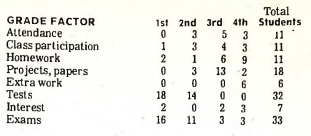
Tliis chart is based on the replies of 40 students asked to
indicate in order of importance what they think most
instructors count in their grade. The “total” column shows
how many students think instructors consider that
particular factor.

This chart shows that six instructors of 14 who replied
consider exams of first importance in grading, four think
interest of second importance, four check class
participation as the third consideration. Five instructors
indicate that attendance figures in their grading.
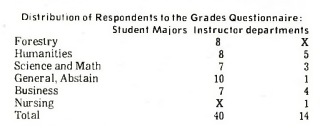
mentally up to making a “good”
or better grade. Frequently it’s
the grade, rather than the
education that is their goal. I
wish there was some viable
alternative to grades.
English Department: I would
prefer not to give grades on
each paper, but rather indicate
areas of strengths and
weaknesses, and at the end of
the quarter evaluate each
student for his overall
improvement and his
contributions. In proposing this
to the student, however, the
majority voted to be graded on
each assignment. They want to know where they stand.
Search councils
SEARCH core group made up
of 16 administrators and faculty
members, has set up three new
councils designed to improve
relations between the faculty
and students at Peninsula.
The three new councils are
administrative, student
services, and budget and
financial.
All councils have faculty and
student representation.
The purpose of the SEARCH
Corp, group is to take a closer
look at the direction Peninsula
is going by organizing, directing
and controlling progress for the
benefit of those concerned.
According to Mr. Wilfred
Morrish, chairman of Search,
the corp’s purpose can be
summed up on one word:
“communication.”
“We as a corps group agreed
to make progress,” said Mr.
Morrish. “We have knocked
down some barriers with the
corps group and we’ve all
agreed to continue and move
on.”
When asked if SEARCH has
any future plans, Mr. Morrish
said that it would be a little
premature to make any
statements at the present time,
as the corps is still in the
planning process.
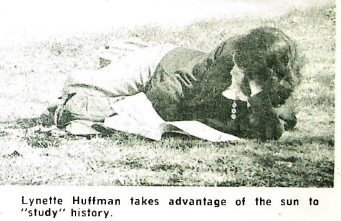
Two speakers visit
Two speakers from the Issues
and Activities Bureau in Seattle
will be here to speak on current
world news topics in the Little
Theater.
Robin David will visit
Thursday, April 26, at noon. He
will speak on the current
situation in Vietnam, dwelling
on the probabilities of a lasting
peace in Southeast Asia.
Tuesday noon, May 15, Craig
Hontz will discuss the United
States’ economic situation at
the present time. In a discussion
of what he calls “Nixonomics,”
he will speak about the
administration’s war on
poverty.
“We tried to arrange for a
speaker on Indian affairs and
the Puyallup fishing issue, but
none was available right now,”
said Ken Singhose.
Singhose requested BOC
funds to sponsor the noon
speakers and arrange their
visits.
HS students visit PC for experience
Students from Quilcene High
School visited Peninsula
College over spring vacation,
and attended three special
classes. The 34 students took
welding, skin diving and
electric appliance repair,
essentially for the experience of
college classes.
Miss Margaret Holm,
communications coordinator
for College District 1, which
includes Jefferson and Clallam
counties, organized the visit.
Miss Holm assumed the
duties of coordinator just before
Christmas vacation, and has
been busy visiting the district’s
high schools and organizing the
quarterly Pen Notes.
She talks to counselors and
incoming freshmen at every
high school, notifying them
exactly what programs PC
offers. Two journalism students
assisted Miss Holm in
formulating Pen Notes. The
articles were written by the people involved.

Campus sport scene
Nancy Lingvall captures badminton title
The Bucaneer congratulates
Nancy Lingvall, winner of the
women’s intramural badminton
singles.
The two remaining teams in
women’s badminton doubles
are Mrs. Moorhead-Denise
Parrish, and Nancy LingvallChris Maier.
In men’s badminton singles,
Rick Schlaffman, Mr.
Brauninger, and Tom O’Meara
were the final competitors.
Mixed doubles finished with
competition between the teams
of Pazan-Linguall, SchlaffmanMaier, Seeker-DeLeo and
Singhose-Moorhead.
Intramural bowling ended
with a match between Thomas
and Ron DeLeo.
Shirts are in for the PC
Bowling Team. They were
donated to the college by the
Olympia Co. through Mr. Carr.
Pacific Northwest Power
Lifting Championships will be
held Saturday, April 14 at 6:30
at Lane CC gymnasium. Tickets
will be one dollar for students,
sold at the door.
WAA members will take a
recreational hike to Shi Shi this
weekend. They’ll start a
softball, track and tennis season
next.
Any archer interested in
representing Peninsula College
in a match against Wapiti
Bowmen Club of Port Angeles
should see Mr. Livingston.
PC baeball team aiming for state tourney in May
Coach Don Huston is working
the baseball team from noon to
2 p.m. every day in anticipation
of the team’s first league game
against Clark at Vancouver,
April 14.
In early games, Jim Clem
pitched a no-hitter at Skagit
valley March 23. Though tne
team lost that game 2-0 on
errors, they won the second of
the doubleheader, 4-1 with Guy
Madison pitching.
Three men—Leo Hall,
catcher; Rick Shirey and Jim
Clem, played together on the
high school team at Enumclaw
two years ago. Returning to the
EC team from last year are Dan
Estes, shortstop; Bob Rupert,
right field, and Clem.
Early indications cite Paul
Reed, third base; Dennis
Jasmer, left field; and Madison,
pitcher, outfield, as strong
hitters. Mike Benz is strong at
first base.
New pitchers for the team this
year are Gordon Rowe, Paul
Stroeder and Randy Twedt.
Gary Francis and Bruce Cox
are catching.
Bill Evenstad mans second
base, Jim Brooks holds third,
Doug Hockenbury usually takes
the outfield and Paul Richmond
stand center.
Guy Madison confirmed Jim
Brooks’ statement that team
spirit is good. Despite the fact
that three games have been
rained out so far, there should
be 10 league games coming
before the state tournament
May 24, 25, 26.
All home games will be
played at Civic Field in Port
Angeles at 1:30 p.m.
Baseball Schedule

Bowling league to defend title
Peninsula College Bowling
League will be defending a
championship title at the
Bellevue Invitational
Tournament at Bellevue next
month.
According to advisorparticpant Dr. Jack Evans, the
league has won the tourney
three years straight.
Top scorer Randy Pease,
averaging 185 points, may have
some competition from new
member Chuck Rondeau, who
bowled an average of 180 at the
first meetings of the league this
quarter.
PC bowling league, now has
16 members, and isstill open for
more. Those interested should
see Dr. Evans, or attend a
Tuesday night game at Laurel
Lanes, 9 to 11 o’clock.
Navy stresses officer training
A representative from the
U.S. Navy Officer Information
team, George C. Bower, visited
here March 5.
There are only a few
requirements upon entering the
Navy now. Any applicant must
be 17 years of age and a U.S.
citizen.
Bower stressed that he was
only representing the officers
training program and anyone
interested in enlisting should go
see the recruiter at the city post
office, second floor, any
Wednesday.
To be a naval officer, men or
women upon completion of their
freshman year of college or a
BA degree an applicant can be a
candidate for ROC (Reserve
Officer Candidate) or AVROC
(Aviation Reserve Officers
Candidate).
The Navy takes applicants
specializing in such fields as
forestry, elementary teaching,
mathematics and engineering.
Scholarships for doctors and
dentists are also available.
Training for men and women
varies from seven to eight
weeks. The Navy pays all
transportation to and from
training camp and for all
uniforms, books and school
fees.
Opportunities for women are
limitless. Women are now in the
aircraft program, on ships and
medical fields. Bower said the
only field now closed to women
is open combat, and even this
will change after the passing of
the equal rights act.
Now that there is no draft, the
Navy has had to take on
salesmenship qualities.
“We can’t afford to advertise
something and then turn around
and give anyone something they
didn’t sign up for,” said Bower.
He also added that the new
•Navy doesn’t have as strict
requirements as it used to,
especially concerning hair
length and clothes.
“Men can now have beards,
mustaches and sideburns,” he
said, “and women can now
wear their hair any length they
want to, as long as it is above
the collar during working
hours.”
Due to the many inquiries on
nursing careers in the Navy,
Bower will return on April 9 and
May 14.
‘Something’
Phi Theta members will
sponsor their second
“Something for Everyone”
party tonight, April 6, from 8 to
12 in the Pub.
There will be many games at
the party, from ping pong to
chess. Faculty, family, and all
students are invited, and the
cost of admission will be 25
cents per person or 49 cents per
couple.
Hot dogs, pop, music, and
possibly some experimental
instruction in folk dancing will
also be available.
The “Something for
Everyone” party has, in the
past, attracted as many as 100
people. Money earned for Phi
Theta this evening will go to the
honor society’s scholarship
fund.
Veterans office granted extension
Extended from the original
Nov. 15-March 15 grant, funds
have been provided for an
additional six weeks to April 30.
The release of federal
Emergency Employment Act
funds enabled the extension.
Veterans Program
Coordinator Bob Willicut and
Peninsula staff are hopeful of
another interim extension at
least until June 30 from the
same source. The program
employs five local Vietnam-era
veterans, all Peninsula
students.
A veteran’s education usually
governs whether or not his
return to civilian life will be
successful. John C. Mundt, state
community college director,
thinks “the community college
provides an ideal solution to the
veteran’s education needs. It
can provide him with remedial
education if he has a learning
deficiency, preparation for a
high school diploma if he lacks
it, vocational education if he
seeks any of 125 different
occupations, or an academic
program if he wants to transfer
to a four-year college.”
The low cost and proximity to
population centers make
community colleges ideal to
returning veterans. The
outreach program conducted by
Willicut and staff members
Rich Olson and Louis Dubois is
aimed at informing veterans
across Clallam and Jefferson
counties of their rights under
the G.I. Bill. These veterans’
counselors also help individual
veterans meet their needs
better through facilities
available at Peninsula College.
A staff member travels weekly
to Forks, Port Townsend,
Sequim and Ediz Hook to talk to
veterans.
G. Louis Dubuois was hired as
an assistant program
coordinator for the campus
Veterans Affairs Office on
March 15. Dubois, from Corpus
Christi, is an ex-Coast
Guardsman. He is a pre-dental
student at Peninsula and will
cover both Forks and local
Coast Guard installations for
the outreach program.
Peninsula College’s Veterans
Affairs Office has a counseling
staff available from 8 a.m. to 5
p.m. daily in the student
services building. Any
problems with the Veterans
Administration or questions of
educational eligibility, late
checks, or general benefits for
veterans can be discussed with
a counselor. Besides the
outreach program, the office
administers the V tutorial
assistance program. Any
veteran is eligible for up to 25
hours of cost-free tutoring in a
subject toward a degree per
month. The office maintains a
list of faculty-recommended
tutors.
The future of the Veterans
Affairs Office on the state’s 26
community college campuses is
currently unknown. Federal
EEA monies, if continued until
June 30, cannot carry the
program beyond Dec. 31. The
possibility of budgeted state
funds, probably funding the
program on a lesser scale, has
been discussed.
Beyond April 30, localized aid
to vets is seriously
questionable. Without extension
of Peninsula’s campus office of
veterans affairs, the nearest
contact would be the Seattle VA
Regional Office.

COC
“Eye of the Beholder” is the
next film sponsored by
Christians on Campus. The
film, which challenges one’s
perception of events and people
by showing four people’s view of
a murder, will be shown in SS-1
at noon Friday, April 13.
An overnight hike and a
“Meet the Monk” week are
planned for this quarter. Meet
the Monk week will have
ministers of different
denominations all over town on
campus to discuss their
church’s viewpoint.
